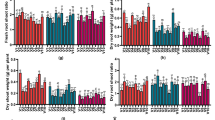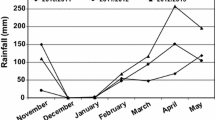Abstract
Maize hybrids that are tolerant to drought at the seedling stage are needed to boost productivity in the rainforest agro-ecology of West Africa. Genetics of tolerance of maize seedling to drought stress is not well understood and is poorly documented. The objectives of this study were to screen early-maturing maize lines for seedling drought tolerance, determine the inheritance and the combining ability of selected inbred lines, and evaluate the performance of seedling drought-tolerant hybrids under field conditions. Forty-nine early maize lines were screened for drought tolerance at the seedling stage. Ten drought-tolerant and two susceptible inbred lines were selected and used in diallel crosses to generate 66 hybrids. The twelve inbred lines and their hybrids were evaluated under induced drought at seedling stage in the screen house and under marginal growing conditions on the field for two seasons. Data collected were subjected to analysis of variance using the DIALLEL-SAS program. Mean squares for both GCA and SCA were significant for most traits in all research environments, indicating that additive and non-additive gene actions are controlling seedling traits under stress conditions. However, for most traits, SCA was preponderant over GCA in all environments, indicating overdominating effect of non-additive gene action. Which in turn implied that the best improvement method for the traits is hybridization. Inbred TZEI 7 had the best GCA effect for seedling traits under screenhouse conditions and for grain yield and other agronomic traits under drought conditions in the field. Hybrids TZEI 357 × TZEI 411 and TZEI 380 × TZEI 410 showed superior SCA effects under screen house conditions. In conclusion, the study established wide genetic variability for drought tolerance at seedling stage among tropical early-maturing maize germplasm however, the non-additive gene action was more important for most seedling traits.


Similar content being viewed by others
References
Akinwale RO, Badu-Apraku B, Fakorede MAB, Vroh-Bi I (2014) Heterotic grouping of tropical early-maturing maize inbred lines based on combining ability in Striga-infested and Striga-free environments and the use of SSR markers for genotyping. Field Crops Res 156:48–62. https://doi.org/10.1016/j.fcr.2013.10.015
Akinwale RO, Awosanmi FE, Ogunnniyi OO, Fadoju AO (2016a) Determinants of drought tolerance at seedling stage in early and extra-early maturing maize hybrids. Maydica 62:1
Akinwale RO, Fakorede MAB, Oluwaranti A, Badu-Apraku B, Adejumobi I (2016b) Selection criteria for drought tolerance at the vegetative phase in early maturing maize. Afr J Biotech 14:1684–5315
Badu-Apraku B, Akinwale RO (2011a) Cultivar evaluation and trait analysis of tropical early maturing maize under Striga-infested and Striga-free environments. Field Crops Res 121:186–194
Badu-Apraku B, Akinwale RO (2011b) Identification of early-maturing maize inbred lines based on multiple traits under drought and low N environments for hybrid development and population improvement. Can J Plant Sci 91:931–942
Badu-Apraku B, Fakorede MAB, Menkir A, Kamara AY, Akanvou L, Chabi Y (2004) Response of early maturing maize to multiple stresses in the Guinea savanna of West and Central Africa. J Genet Breed 58:119–130
Badu-Apraku B, Oyekunle M, Akinwale RO, Lum FA (2011) Combining ability and heterotic groups of early-maturing tropical white maize inbred lines under stress and nonstress environments. Agron J 103:544–557
Baker RJ (1978) Issues in diallel analysis. Crop Sci 18:533–536
Bell J (2017) Corn growth stages and development. Texas A&M AgriLife Extension and Research Agronomist, Amarillo. USA
Bocev BV (1963) Maize selection at an initial phase of development. Kukuruzu, 1, p. 54
Cassman KG (1999) Ecological intensification of cereal production systems: yield potential, soil quality, and precision agriculture. Proc Natl Acad Sci USA 96:5952–5959
Critchley W, Klaus S (1991) A manual for the design and construction of water harvesting schemes for plant production. http://www.fao.org/docrep/U3160E/u3160e00.HTM. Accessed 2 May 2015
Edmeades GO (2008) Drought tolerance in maize: an emerging reality. A Feature in James, Clive. Global Status of Commercialized Biotech/GM Crops. International Service for the Acquisition of Agri-biotech Applications (ISAAA) Brief No. 39. ISAAA, Ithaca, NY, p 8
Edmeades GO, Chapman SC, Bolaños J, Bänziger M and Lafitte H R (1994). Recent evaluations of progress in selection for drought tolerance in tropical maize. Paper presented at the Fourth Eastern, Central and Southern African regional maize conference, Harare, Zimbabwe, 28 March–1 April. p 89
Fakorede MAB (1985) Response of maize to planting dates in a tropical rainforest location. Exp Agric 21:19–30
Fakorede MAB, Akinyemiju OA (2003) Climatic change: effects on maize production in a tropical rain forest location. In: B Badu-Apraku, MAB Fakorede, M Ouedraogo, RJ Carsky, A Menkir (eds) Maize revolution in West and Central Africa, pp 272–282. Proceedings of a regional workshop, IITA-Cotonou, Benin Republic, 14–18 May 2001
Fakorede MAB, Opeke B (1985) Weather factors affecting the response of maize to planting dates in a tropical rainforest location. Exp Agric 21:31–40
Griffing B (1956) Concepts of general and specific combining ability in relation to diallel crosses system. Aust J Biol Sci 9:463–493
Hussain I (2009) Genetics of drought tolerance in maize (Zea mays L.). Ph.D. Thesis, Department of Plant Breeding and Genetics, University of Agriculture, Faisalabad, Pakistan
Ifie BE (2013) Genetic analysis of Striga resistance and low soil nitrogen tolerance in early maturing maize (Zea mays L.) inbred lines. Ph.D Thesis, West Africa Centre for Crop Improvement, School of Agriculture and Consumer Sciences, University of Ghana, Legon
Koscielniak J, Dubert F (1985) Biological indices of productivity of various breeding lines of maize. III. Correlation between simple and final yield of grain and dry matter under natural conditions of vegetative growth. Acta Agra Silvestria Ser Agra 24:35–48
Mahmoud A, Mohamed I (2014) A diallel analysis of drought tolerance indices at seedling stage in bread wheat (Triticum aestivum L.). Plant Breed Biotechnol 2(3):276–288
Maiti RK, Amaya LED, Cardana SI, Oimas AMO, De La Rosa-Ibarra M, De Leoncastillo H (1996) Genotypic variability in maize cultivars for resistance to drought and salinity at seedling stage. J Plant Physiol 148:741–744
Makumbi D, Betran FJ, Banziger M, Ribaut J (2011) Combining ability, heterosis and genetic diversity in tropical maize (Zea mays L.) under stress and non-stress conditions. Euphytica 180:143–162. https://doi.org/10.1007/s10681-010-0334-5
Meeks M, Murray SC, Hague S, Hays D (2013) Measuring maize seedling drought response in search of tolerant germplasm. Agronomy 3:135–147
Mehdi S, Ahmad N, Ahsan M (2001) Evaluation of S1 maize (Zea mays L.) families at seedling stage under drought conditions. J Biol Sci 1:4–6
Oluwaranti A, Fakorede MAB, Akinwale RO, Popoola T, Menkir A, Badu-Apraku B (2014) Drought tolerance at the vegetative and maturity growth stages of maize in a rainforest location of South-west Nigeria. Aust J Agric Res 5(1):1–11
Reynolds MP, Rebetzke G, Pellegrinesci A, Trethowan R (2006) Chapter 11: Drought adaptation in wheat. In: Ribaut JM (ed) Drought tolerance in cereals. Hawaorths Food Products press, New York, pp 402–436
Soil Survey Staff (1999) Soil taxonomy: a basic system of soil classification for making and interpreting soil survey. Agricultural Handbook 43, 2nd edn. Natural Resource Conservation Service USDA, Washington, US Government Printing Office, pp 869–873
Statistical Analysis Software (SAS) Institute (2002) SAS/STAT User’s Guide version 9.1, (TS1M0), SAS Institute Incorporated, Cary, North Caroline, USA
Vadez V (2014) Root hydraulics. The forgotten side of roots in drought adaptation. Fields Crops Res 165:15–24
Vasal SK, Srinivasan G, Pandey S, Gonzalez F, Crossa J, Beck DL (1993) Heterosis and combining ability of CIMMYT’s quality protein maize germplasm: I. Lowland tropical. Crop Sci 33:46–51. https://doi.org/10.2135/cropsci1993.0011183X003300010006x
Zeinab EG, Helal AG (2014) Diallel analysis and separation of genetic variance components in eight faba bean genotypes. Ann Agric Sci 59(1):147–154
Zhang Y, Kang MS, Kendall RL (2005) DIALLEL-SAS05: a comprehensive programme for Griffing’s and Gardner–Eberhart Analyses. Agron J 97:1097–1106
Author information
Authors and Affiliations
Corresponding author
Rights and permissions
About this article
Cite this article
Adewale, S.A., Akinwale, R.O., Fakorede, M.A.B. et al. Genetic analysis of drought-adaptive traits at seedling stage in early-maturing maize inbred lines and field performance under stress conditions. Euphytica 214, 145 (2018). https://doi.org/10.1007/s10681-018-2218-z
Received:
Accepted:
Published:
DOI: https://doi.org/10.1007/s10681-018-2218-z




